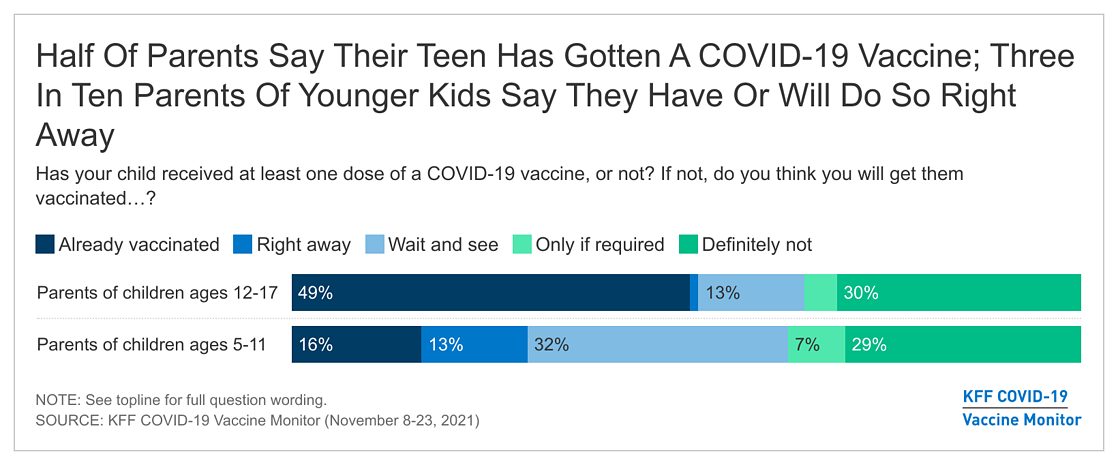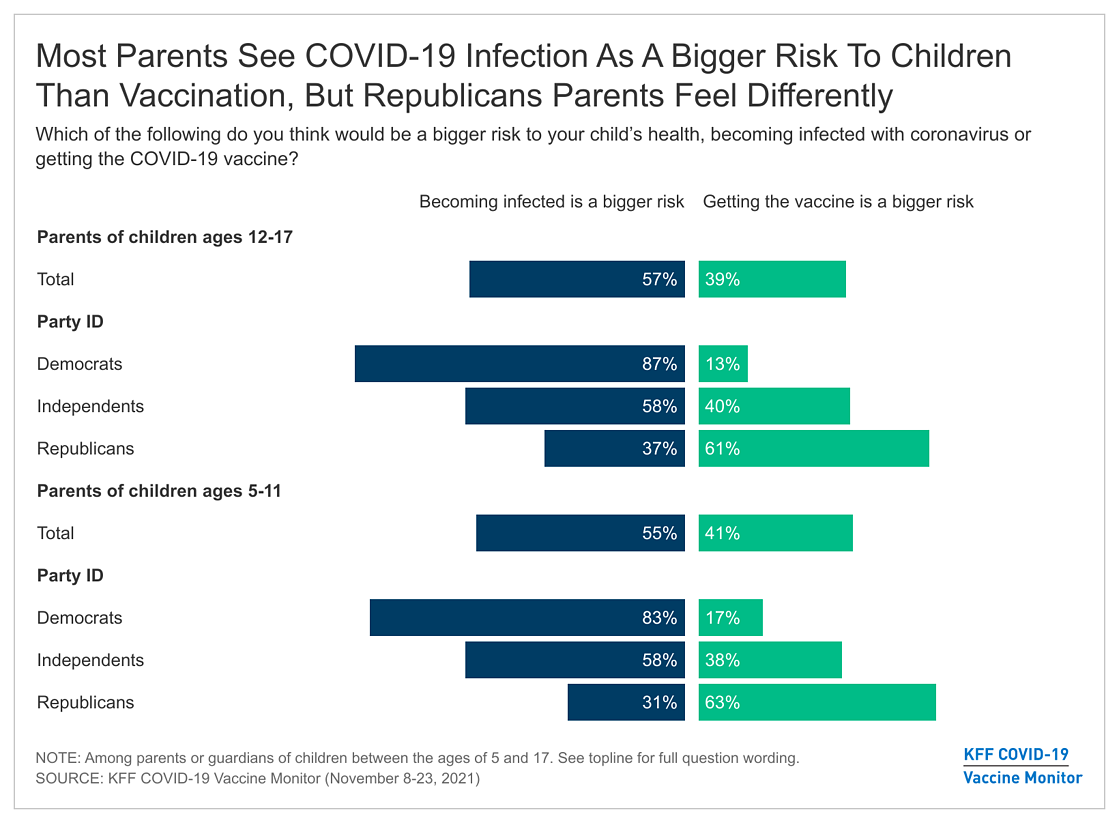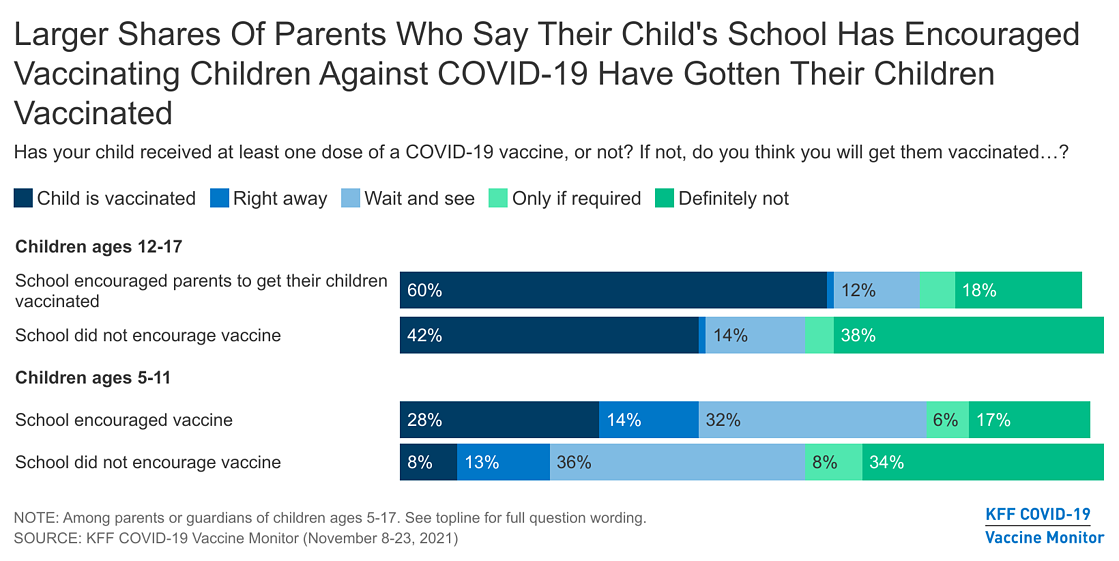
The independent source for health policy research, polling, and news.
Half of Parents of Adolescents 12-17 Say Their Child Has Gotten a COVID-19 Vaccine, though Uptake Has Slowed; 16% of Parents of 5-11 Year-olds Say Their Child Has Gotten a Vaccine
Most Parents See COVID-19 as a Greater Risk to their Children than the Vaccines, Though Many Still Lack Confidence in the Vaccines’ Safety for Children
COVID-19 vaccine uptake among adolescents ages 12-17 has slowed after an initial wave of enthusiasm over the summer, with half (49%) of parents saying their adolescent has received at least one dose, a new KFF COVID-19 Vaccine Monitor report reveals. The share is little changed since earlier in the fall.
Just 1% of parents of adolescents now say they will get their adolescent vaccinated as soon as possible, and 13% say they want to wait and see how it works for others before doing so. Three in ten say they will definitely not get their teen vaccinated. The survey was in the field prior to news of the omicron variant, which could change views.
Parents of children ages 5-11, who became eligible for a COVID-19 vaccine in the past month, remain less eager. About three in ten say that their child already has been vaccinated (16%) or that they plan to get their child vaccinated right away (13%). Nearly a third (32%) say they want to wait and see how it works for other children first, while three in ten (29%) say they will definitely not get their child vaccinated.
There are about 28 million children ages 5-11 and 25 million adolescents ages 12-17 in the United States.
As with adults, there is a large partisan divide in parents’ intentions for their children.
The vast majority (80%) of Democrats say their adolescent child already has gotten vaccinated, while more than half say they’ve already gotten their 5-11 year old child vaccinated (24%) or plan to do so as soon as possible (28%). Just 7% of Democratic parents of children in each age group say they definitely will not get their children vaccinated.
In contrast, about half of Republican parents say they definitely will not get their 12-17 year old (51%) or 5-11 year old (49%) children vaccinated. Independents fall in between the two groups.
There are about 28 million children ages 5-11 and 25 million adolescents ages 12-17 in the United States.
As with adults, there is a large partisan divide in parents’ intentions for their children.
The vast majority (80%) of Democrats say their adolescent child already has gotten vaccinated, while more than half say they’ve already gotten their 5-11 year old child vaccinated (24%) or plan to do so as soon as possible (28%). Just 7% of Democratic parents of children in each age group say they definitely will not get their children vaccinated.
In contrast, about half of Republican parents say they definitely will not get their 12-17 year old (51%) or 5-11 year old (49%) children vaccinated. Independents fall in between the two groups.
While Black and Hispanic adults initially were less likely to get vaccinated than White adults, parents of 5-11 year-olds report no significant differences in their intention to vaccinate their child regardless of race or ethnicity. Among parents of adolescents, Hispanic parents (62%) are somewhat more likely than Black (48%) or White (42%) parents to say their teen has been vaccinated.
Though official scientific bodies in the U.S. and worldwide, including the U.S. Food and Drug Administration, have deemed the vaccines as safe and effective at preventing serious COVID-19 illnesses for adults and school-age children, many parents still have concerns.
About half (52%) are confident in their safety for adolescents and about four in ten (43%) are confident in their safety for 5-11 year old children. This reflects a lower level of confidence in the vaccine’s safety for children than for adults, for which nearly two-thirds (63%) say they are confident in its safety.
When asked whether getting infected by the virus or getting the vaccine poses a bigger risk to their children, more parents of both 12-17 year old adolescents and of 5-11 year old children say they believe getting infected is a bigger risk (57% and 55% respectively). Fewer say the vaccine is a bigger risk (39% and 41% respectively).
However, unvaccinated parents overwhelmingly believe that the vaccine poses a greater risk to their 12-17 year old (80%) and 5-11 year old (71%) children, even though scientific bodies have concluded the opposite is the case. Majorities of Republican parents of children ages 12-17 (61%) and of children ages 5-11 (63%) also believe the vaccines pose a greater risk.
Many Schools Play a Role in Providing Information to Parents and Encouraging Vaccinations
About half (49%) of parents of school-age children say their schools have provided information about how to get a vaccine for their child, and nearly as many (44%) say their school has encouraged parents to get their child vaccinated.
The report finds a relationship between a school’s encouragement and vaccinations.
Among parents of 5-11 year-olds, 28% of those whose schools encouraged vaccinations and 8% of those whose schools did not say that their child has been vaccinated.
Importantly, two thirds (67%) of parents of school-age children say they do not want schools to require all eligible students to get a vaccine, while a third (32%) say they favor such requirements. The vast majority (92%) of Republican parents oppose such a requirement, as do two thirds (67%) of independent parents. A slight majority (55%) of Democratic parents favor a vaccine mandate for eligible students.
The report also notes:
- Most parents say they don’t have enough information about the effectiveness (58%), side effects (63%), or safety (61%) of the COVID-19 vaccines in children. Groups of parents who are less likely to say they have a vaccinated child – including younger parents, those without college degrees, and Republicans – are more likely to say they don’t have enough information.
- Hispanic and Black parents are more likely than White parents to express concerns about access to vaccines for their children. For example, among those whose child has not yet been vaccinated, more Hispanic (47%) and Black (43%) than White (23%) parents say they are concerned about having to miss work to take their children to get vaccinated or care for them if they experience side effects.
- Fewer than half of parents say they talked to their child’s pediatrician about the COVID-19 vaccines. Parents say their pediatricians mostly recommended vaccinations, though 16% of parents with adolescents and 15% of parents with children ages 5-11 say that they spoke to the pediatrician and that the pediatrician did not recommend vaccination.
- Nearly three quarters (73%) of parents say the pandemic has negatively impacted their children’s education. Almost six in ten (58%) say it has negatively affected their own mental health, and four in ten say it has negatively affected their ability to care for their children. Half of parents say the pandemic has had a negative impact on their ability to afford basic necessities, including higher shares of lower income parents (73%), Hispanic parents (61%), Black parents (59%), and mothers (57%).
Designed and analyzed by public opinion researchers at KFF, this KFF Vaccine Monitor survey was conducted November 8-23 among a nationally representative sample of 1,196 parents with a child under age 18 in their household. Interviews were conducted in English and Spanish by telephone (483) and online (713) through a probability-based online panel. The margin of sampling error is plus or minus 4 percentage points for the full sample of parents, 5 percentage points for parents with a child ages 12-17 and 5 percentage points for parents with a child ages 5-11. For results based on other subgroups, the margin of sampling error may be higher.
The KFF COVID-19 Vaccine Monitor is an ongoing research project tracking the public’s attitudes and experiences with COVID-19 vaccinations. Using a combination of surveys and qualitative research, this project tracks the dynamic nature of public opinion as vaccine development and distribution unfold, including vaccine confidence and acceptance, information needs, trusted messengers and messages, as well as the public’s experiences with vaccination.


